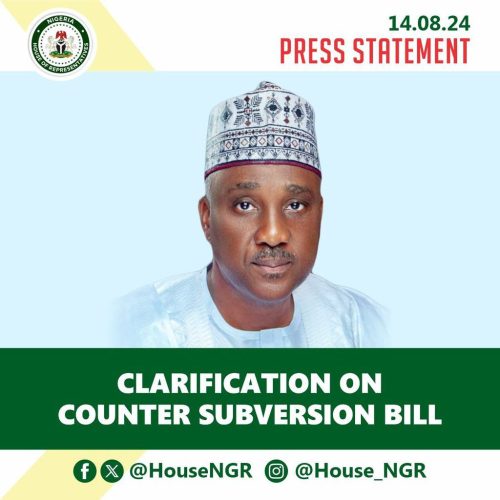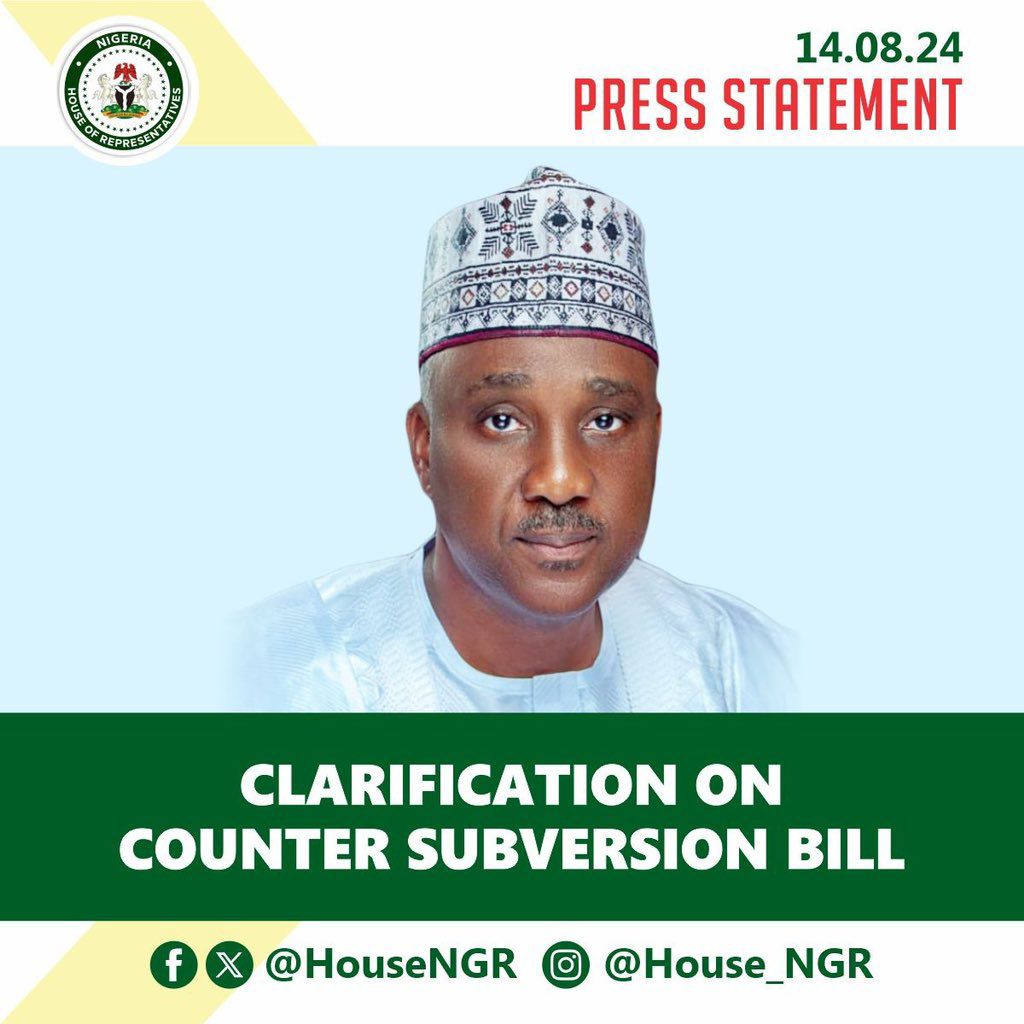The House of Representatives has clarified the Counter Subversion Bill 2024, which aims to impose a 10-year jail term or a fine of N5 million on Nigerians who fail to recite the national anthem. The bill is sponsored by Speaker Tajudeen Abbas.
The Bill “stipulates that anyone found guilty of destroying national symbols, refusing to recite the national anthem and pledge, defacing a place of worship with intent to incite violence, or undermining the Federal Government shall face a fine of N5 million, a 10-year prison sentence, or both”.
The Bill also “states that anyone who sets up an illegal roadblock performs unauthorised traffic duties, imposes an illegal curfew, or organises an unlawful procession will be subject to a fine of N2 million, five years in prison, or both upon conviction”.
Also, any person who “forcefully takes over any place of worship, town hall, school, premises, public or private place, arena, or a similar place through duress, undue influence, subterfuge or other similar activities, commits an offence and is liable on conviction to a fine of N5 million or imprisonment for a term of 10 years or both”.
“A person who professes loyalty, pledges or agrees to belong to an organisation that disregards the sovereignty of Nigeria, commits an offence and is liable on conviction to a fine of N3 million or imprisonment for a term of four years or both.”
Reacting to the outrage by Nigerians who opposed the bill stating that it was Draculian, Musa Abdullahi Krishi, the Special Adviser on Media and Publicity to the Speaker stated that the bill which was in its introductory stage falls under the anti-terrorism framework which addresses cults, bandits, proscribed groups amongst others.

He made it clear that in the Second Reading of the Bill, members of the House would be free to discuss and analyse the Bill to check out its merits and demerits.
The statement posited that the bill does not target any particular group and will pads through legislative “processes & Nigerians would have ample opportunity to make their inputs which’ll constitute the final consideration (or otherwise) of the Bill.”
The full Press Statement from the Office of the Speaker, House of Representatives reads;
August 14, 2024
CLARIFICATION ON COUNTER SUBVERSION BILL
…Draft legislation still at introductory stage
…House welcomes robust discussions on the Bill, and how to address concerns
The attention of the Speaker, House of Representatives, Rt. Hon. Abbas Tajudeen, Ph.D has been drawn to reports in sections of the media about the Counter Subversion Bill, which he sponsored.
The Speaker appreciates the interest Nigerians have so far shown on the Bill, which pertains to our national security.
However, it has become necessary to make the following clarifications, considering the tilted reports and misconceptions about the Bill:
1. The Counter Subversion Bill, 2024 (HB. 1652) was introduced on the floor of the House of Representatives on Tuesday, July 23, 2024, with Speaker Abbas Tajudeen, Ph.D. as the sponsor. Thus, the Bill is still at the introductory stage.
2. The Bill falls within the realm of Nigeria’s anti-terrorism framework, and it seeks to address subversive activities by associations, organisations, militias, cults, bandits, and other proscribed groups in Nigeria.
3. Similar legislation obtains in other climes with varied appellations. Such countries include the United Kingdom, Spain, India, Turkey, Canada, Australia, among others.
4. The Speaker, and by extension the House of Representatives, which is the People’s House, welcome robust engagements and discussions from Nigerians on the contents of the Bill, and how best to address the concerns raised.
5. By Parliamentary processes and procedures, the Bill would have to be listed for Second Reading, where Members will thoroughly scrutinize its merits and demerits during debate.
At this stage, Members can decide to ‘kill’ or allow the Bill to pass. But if it scales Second Reading, it would be referred to the relevant Committee of the House for further legislative action.
6. The Committee must as a matter of responsibility invite the Nigerian public, particularly relevant stakeholders, to a public hearing on the Bill.
It is expected that citizens would bear their minds either physically or via memoranda on the Bill. Their inputs would form the basis for the Committee’s report, to be laid on the floor of the House.
7. After the consideration of the report, the Bill will be passed for the Third Reading and forwarded to the Senate for concurrence.
If the Senate deems it fit and concurs with the Bill, a clean copy would be transmitted to the President for assent. Mr. President reserves the right to withhold assent to the Bill.
The Speaker assures Nigerians that the Bill is all-encompassing as it relates to Nigeria’s national security and does not target any group or section of the country. He further promises that the Bill & indeed any other draft legislation before the House will pass through all the legislative processes & Nigerians will have ample opportunity to make their inputs which will constitute the final consideration (or otherwise) of the Bill.




